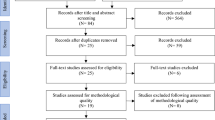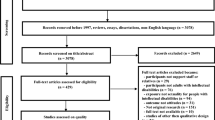Abstract
Every individual should have equal access to sexuality-related information and services. Regrettably, societal stigma revolves around the sexuality of youth with disabilities, with a common misconception that they are asexual, and therefore do not need to be taught about sexuality and sexual health. Healthcare providers (PHCPs) have reported barriers to having sexuality-related conversations with youth with disabilities, such as lack of time and personal discomfort. As such, we sought to examine what might facilitate PHCPs to have conversations about sexuality with their paediatric clients and families. A qualitative focus group study using a descriptive exploratory approach was conducted. Five PHCP participants from a paediatric rehabilitation hospital participated in a focus group. Five young adult (YA) participants with a self-reported disability took part in a separate focus group or individual interviews. Descriptive thematic analysis was used to identify, analyze, and report themes in the data. Results showed that persisting assumptions impede children and youth with disabilities from exploring their sexuality; that autonomy, safety, trust, and consent are critical topics that should be addressed in sexuality-related clinical conversations; and that sexuality-related services should be improved by providing greater disability-specific information, having age-appropriate discussions from an early age, and increasing interdisciplinary care. Normalizing sexuality-related discourse in clinical settings may help youth with disabilities construct a healthy sexual identity, fulfill their sexual needs, and develop adequate skills to deal with sexual situations safely and appropriately.
Similar content being viewed by others
References
Who: Developing sexual health programmes. A framework for action. Reprod. Health 2010, 55 (2010)
Department of Health and Human Services: CDC/HRSA Advisory Committee on HIV and STD Prevention and Treatment Record of the Proceedings (2011)
East, L.J., Orchard, T.R.: Somebody else’s job: experiences of sex education among health professionals, parents and adolescents with physical disabilities in southwestern Ontario. Sex. Disabil. 32, 335–350 (2014). https://doi.org/10.1007/s11195-013-9289-5
Akre, C., Light, A., Sherman, L., Polvinen, J., Rich, M.: What young people with spina bifida want to know about sex and are not being told. Child. Care. Health Dev. 41, 963–969 (2015). https://doi.org/10.1111/cch.12282
Hall, M.: Disability, discourse and desire: analyzing online talk by people with disabilities. Sexualities 21, 379–392 (2018). https://doi.org/10.1177/1363460716688675
Verhoef, M., Barf, H.A., Vroege, J.A., Post, M.W., Van Asbeck, F.W., Gooskens, R.H., Prevo, A.J.: Sex education, relationships, and sexuality in young adults with spina bifida. Arch. Phys. Med. Rehabil. 86, 979–987 (2005). https://doi.org/10.1016/j.apmr.2004.10.042
Hunt, X., Braathen, S.H., Swartz, L., Carew, M.T., Rohleder, P.: Intimacy, intercourse and adjustments: Experiences of sexual life of a group of people with physical disabilities in South Africa. J. Health Psychol. 23, 289–305 (2018). https://doi.org/10.1177/1359105317741761
Rueda, H.A., Bolin, J.S., Linton, K.F., Williams, L.R., Pesta, E.: Social workers’ roles in supporting the sexual and relational health of children with disabilities. Child Adolesc. Soc. Work J. 34, 493–505 (2017). https://doi.org/10.1007/s10560-016-0469-x
Mueller-Johnson, K., Eisner, M.P., Obsuth, I.: Sexual victimization of youth with a physical disability: an examination of prevalence rates, and risk and protective factors. J. Interpers. Viol. 29, 3180–3206 (2014). https://doi.org/10.1177/0886260514534529
Wissink, I.B., van Vugt, E., Moonen, X., Stams, G.J.J.M., Hendriks, J.: Sexual abuse involving children with an intellectual disability (ID): a narrative review. Res. Dev. Disabil. 36, 20–35 (2015). https://doi.org/10.1016/j.ridd.2014.09.007
Shandra, C.L., Chowdhury, A.R.: The first sexual experience among adolescent girls with and without disabilities. J. Youth Adolesc. 41, 515–532 (2012). https://doi.org/10.1007/s10964-011-9668-0
Wiseman-Hakes, C., Saleem, M., Poulin, V., Nalder, E., Balachandran, P., Gan, C., Colantonio, A.: The development of intimate relationships in adolescent girls and women with traumatic brain injury: a framework to guide gender specific rehabilitation and enhance positive social outcomes. Disabil. Rehabil. (2019). https://doi.org/10.1080/09638288.2019.1597180
Engelen, M.M., Knoll, J.L., Rabsztyn, P.R.I., Maas-van Schaaijk, N.M., van Gaal, B.G.I.: Sexual health communication between healthcare professionals and adolescents with chronic conditions in western countries: an integrative review. Sex. Disabil. 38, 191–216 (2020). https://doi.org/10.1007/s11195-019-09597-0
Murphy, C., Lincoln, S., Meredith, S., Cross, E.M., Rintell, D.: Sex education and intellectual disability: practices and insight from paediatric genetic counselors. J. Genet. Couns. 25, 552–560 (2016). https://doi.org/10.1007/s10897-015-9909-6
Streur, C.S., Schafer, C.L., Garcia, V.P., Wittmann, D.A.: “I don’t know what I’m doing… I hope I’m not just an idiot”: the need to train paediatric urologists to discuss sexual and reproductive health care with young women with Spina Bifida. J. Sex. Med. 15, 1403–1413 (2018). https://doi.org/10.1016/j.jsxm.2018.08.001
Saxe, A., Flanagan, T.: Unprepared: an appeal for sex education training for support workers of adults with developmental disabilities. Sex. Disabil. 34, 443–454 (2016). https://doi.org/10.1007/s11195-016-9449-5
Young, R., Gore, N., McCarthy, M.: Staff attitudes towards sexuality in relation to gender of people with intellectual disability: a qualitative study. J. Intellect. Dev. Disabil. 37, 343–347 (2012). https://doi.org/10.3109/13668250.2012.704983
Holland-Hall, C., Quint, E.H.: Sexuality and disability in adolescents. Pediatr. Clin. North. Am. 64, 435–449 (2017). https://doi.org/10.1016/j.pcl.2016.11.011
Rowen, T.S., Stein, S., Tepper, M.: Sexual health care for people with physical disabilities. J. Sex. Med. (2015). https://doi.org/10.1111/jsm.12810
Campbell, M.: Disabilities and sexual expression: a review of the literature. Sociol. Compass 11, 1–19 (2017). https://doi.org/10.1111/soc4.12508
Patton, M.Q.: Qualitative Research and Evaluation Methods: Integrating Theory and Practice. Sage, Saint Paul (2015)
Guest, G., Namey, E., Taylor, J., Eley, N., McKenna, K.: Comparing focus groups and individual interviews: findings from a randomized study. Int. J. Soc. Res. Methodol. 20, 693–708 (2017). https://doi.org/10.1080/13645579.2017.1281601
Braun, V., Clarke, V.: Using thematic analysis in psychology. Qual. Res. Psychol. 3, 77–101 (2006). https://doi.org/10.1191/1478088706qp063oa
Lambert, S.D., Loiselle, C.G.: Combining individual interviews and focus groups to enhance data richness. J. Adv. Nurs. 62, 228–237 (2008). https://doi.org/10.1111/j.1365-2648.2007.04559.x
Fade, S.A., Swift, J.A.: Qualitative research in nutrition and dietetics: data analysis issues (2011). http://www.ncbi.nlm.nih.gov/pubmed/21091920
Statistics Canada: Canadian Survey on Disability Reports. https://www150.statcan.gc.ca/n1/en/catalogue/89-654-X
Gatti, C., Del Rossi, C., Ferrari, A., Casolari, E., Casadio, G., Scire, G.: Predictors of successful sexual partnering of adults with spina bifida. J. Urol. 157, 1911–1916 (2009)
Heller, M.K., Gambino, S., Church, P., Lindsay, S., Kaufman, M., McPherson, A.C.: Sexuality and relationships in young people with Spina Bifida and their partners. J. Adolesc. Heal. 59, 182–188 (2016). https://doi.org/10.1016/j.jadohealth.2016.03.037
Mccabe, J., Holmes, D.: Nursing, sexual health and youth with disabilities: a critical ethnography. J. Adv. Nurs. 70, 77–86 (2014). https://doi.org/10.1111/jan.12167
Bray, L., McKenna, J., Sanders, C., Pritchard, E.: Discussing sexual and relationship health with young people in an acute children’s hospital. J. Res. Nurs. 17, 231–242 (2012). https://doi.org/10.1177/1744987110383356
Acknowledgements
The authors would like to acknowledge the following individuals for their contribution to the study and/or preparation of this manuscript: Alyssa Neville, Cristina Malana, Andrew Gurza, Dilshad Kassam-Lallani, and Marie Hooper.
Funding
This study was funded by Holland Bloorview Kids Rehabilitation Hospital, in partnership with the Accessibility Directorate of Ontario.
Author information
Authors and Affiliations
Corresponding author
Ethics declarations
Conflict of interest
All authors declare that they have no conflict of interest.
Additional information
Publisher's Note
Springer Nature remains neutral with regard to jurisdictional claims in published maps and institutional affiliations.
Rights and permissions
About this article
Cite this article
Bonder, R., Wincentak, J., Gan, C. et al. “They Assume That You’re Not Having Sex”: A Qualitative Exploration of How Paediatric Healthcare Providers Can Have Positive Sexuality-Related Conversations with Youth with Disabilities. Sex Disabil 39, 579–594 (2021). https://doi.org/10.1007/s11195-021-09686-z
Accepted:
Published:
Issue Date:
DOI: https://doi.org/10.1007/s11195-021-09686-z




